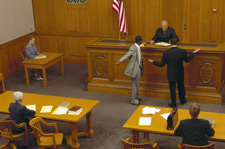- 01: Introduction
- 02: History
- 03: Propellants, Firearms, and Ammunition Development
- 04: Modern Firearms Manufacture
- 05: Small Arms Ammunition
- 06: Evidence Handling Procedures
- 07: Equipment and Instrumentation
- 08: Examination of Firearms
- 09: Cartridge and Shotshell Examination
- 10: Characterization and Evaluation of Fired Projectiles
- 11: Bullet Comparison and Identification
- 12: Gunshot Residue and Distance Determination
- 13: Toolmark Identification
- 14: Communicating Results
- Resources


Expert Witness Qualification
Home > Communicating Results > Courtroom Testimony > Expert Witness Qualification

In more sequential terms, what transpires is that the examiner is called to the stand. The attorney who called this individual then proceeds with a line of questions designed to establish the qualifications (education, training, knowledge, skill, etc.) that are sufficient for the court to accept them as an expert in their particular field. The attorney, at the conclusion of his qualifying questions then “proffers the witness” as an expert in the field. Prior to the court ruling, the judge will inquire whether the opposing counsel wishes to make an inquiry of the witness, which is known as “voir dire.” This provides the opposing counsel an opportunity to challenge the qualifications and preclude the examiner from being accepted by the court as an expert.
If the court does not recognize the examiner as an expert in the particular field, then the examiner will not be permitted to give any opinion testimony. On the other hand, where an examiner is recognized by the court as an expert in a particular field, the examiner will be permitted to give opinion testimony evidence.
Attorneys (both prosecution and defense) may attempt a tactic where, after being recognized as an expert in a particular field, they attempt to elicit opinion testimony outside the range of their particular expertise. All attempts to solicit an opinion outside the scope of an examiner’s expertise should be responded to with “I am unable to render an opinion in that field as I am not qualified as an expert in that particular area.”
Witnesses must ensure that their curriculum vitae (CV) is accurate, complete, and free of any errors or omissions. Examiners should not underestimate opposing counsel checking into the background and representations of the witness on the CV.




